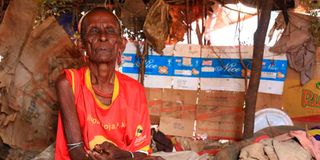Drought: Thousands of learners drop out of school in northeast

Nchoro Arbelle, 80, one of many people affected by hunger, in her manyatta at Murup area in Marsabit County on November 17, 2021.
More than 13,000 students in over 60 schools in Marsabit and Samburu counties are struggling to stay in school due to the biting drought.
Over 2,000 learners have also reportedly dropped out of school because of the prolonged drought and biting famine in the two counties.
Speaking to the Nation during relief food distribution by the Lake Turkana Wind Power Project Company at Loiyangalani, Laisamis sub-county, Education Director Andrew Galgithele decried the adverse effect of famine on learners in the region.
“The drought has caused disruption in schools as thousands of learners stay away due to starvation. Not all students can withstand the pangs of hunger only to go back home to find there is no food,” Mr Galgithele said.
He explained that a large number of students keep away from school when there is no feeding programme.
Kenya Primary School Head Teachers Association (Kepsha) Loiyangalani chapter chairperson Jacob Naikeli said the drought had affected pupils’ enrolment in the third term.
Of the 7,000 learners in Laisamis sub-county, Mr Naikeli said, 6,000 show up daily.
Some have left with their families in search of pasture and food in neighbouring counties while others were sent by their parents to fish along the Loiyangalani lakeshore to make money for food, he explained.
Over 1,000 were yet to report back
The situation has worsened since the national government’s relief food distribution to schools in the region ceased in July 2021.
Residents said Lake Turkana Wind Power’s gesture of providing relief food schools in the region had helped the community, saying the supplies would motivate learners to stay in school and boost enrolment.
Samburu North sub-county Education Director Julius Leisat said all schools in the region had been severely hit by famine.
Of the 9,000 students enrolled in the region’s schools, over 1,000 were yet to report back for the third term, he said.
Marsabit County Education Director Apollo Apukko, for his part, called on parents to be patient as the government considered food distribution to the region. He noted that the only way of improving access to learning in arid areas was through sustained school feeding programmes.
Lake Turkana Wind Power CEO Phylip Leferink said the project was vital and timely for pupils’ education during their last term of the academic year.
“As a result of the prolonged drought, many learners were reported to be dropping out of school. We had to come up with a temporary emergency food programme to rescue the situation,” Mr Leferink said.
The company’s social governance manager, Felix Rottman, said they had launched an emergency food programme that would benefit 13,000 primary school learners in 60 hard-hit schools in Marsabit and Samburu North.
The programme, valued at Sh12.8 million, seeks to keep students in school for three months between January 10 and March 10.





